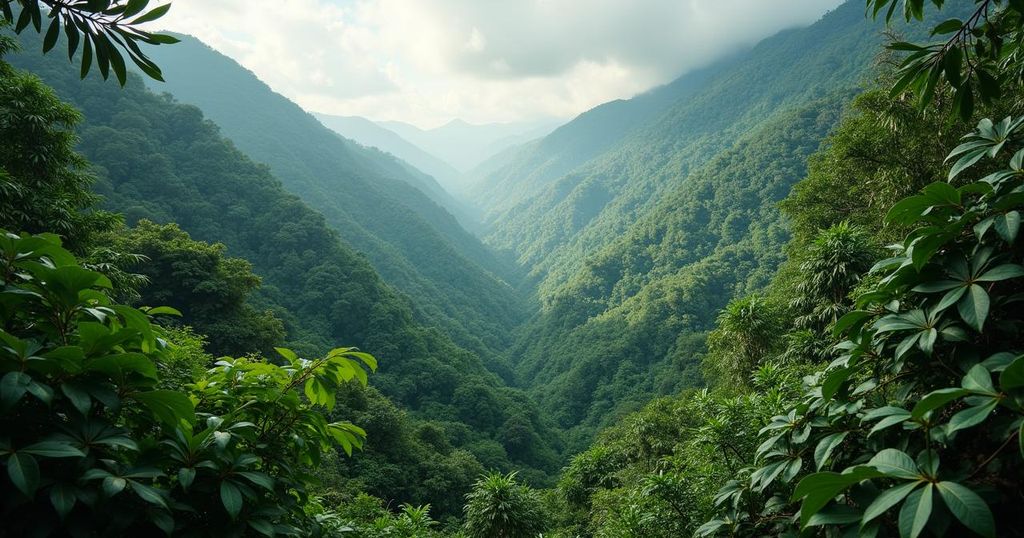Impact of Climate Change on Methane Dynamics in the Amazon Rainforest

A recent study from the University of São Paulo indicates that climate change could drastically alter methane dynamics in the Amazon Rainforest, increasing methane production in floodplains while decreasing uptake in upland forests by 70%. This research highlights the urgency for conservation measures as these changes could significantly impact global greenhouse gas emissions.
Climate change has been shown to substantially influence methane dynamics within the Amazon Rainforest, as demonstrated by a recent study from researchers at the University of São Paulo (USP) in Brazil. The research indicates that projected extreme temperature variations and humidity levels—characterized by excessive rainfall or drought—could significantly increase the population of methane-producing microorganisms in the Amazon’s flooded areas, while simultaneously diminishing methane uptake in its upland forests by up to 70%. This decline in methane absorption holds global implications for greenhouse gas emissions and climate change mitigation efforts. The findings of this study were published in the journal Environmental Microbiome and underscore the pressing need for effective conservation and management strategies in response to the drastic environmental changes anticipated for the region. It is important to note that, during at least six months each year, over 800,000 square kilometers of floodplains in the Amazon experience prolonged inundation, which is exacerbated by seasonal rainfall and rising river levels. During this time, organic matter decomposition by microbial communities leads to increased methane production. In fact, recent findings indicate that these floodplains are responsible for contributing approximately 29% of global wetland methane emissions. Conversely, the Amazon’s upland forests serve as vital methane sinks, playing a fundamental role in capturing atmospheric methane and thus regulating greenhouse gas emissions. “Although it has been established that environmental factors such as temperature and seasonal floods can affect the composition of microbial populations and the associated methane exchange, it is crucial to understand how climate change will influence future scenarios,” stated Júlia Brandão Gontijo, the first author of the study and a current postdoctoral researcher at the University of California, Davis. This investigation formed part of Gontijo’s doctoral research at the Center for Nuclear Energy in Agriculture (CENA-USP), under the guidance of Professor Tsai Siu Mui. Gontijo noted that atmospheric methane concentrations have seen an alarming increase of approximately 18% over the past four decades. Collaborating with fellow researchers from various esteemed institutions, including the Netherlands Institute of Ecology (NIOO-KNAW), Stanford University, and the Federal University of Western Pará (UFOPA), the study involved a comprehensive 30-day experimental assessment. Soil samples from both floodplains and an upland forest were subjected to varying conditions of extreme temperatures and humidity. Findings showed a rise in methane-producing microorganisms within the floodplain soils, highlighting potential future challenges even though methane emission patterns remained stable during the study period. Moreover, the study noted a striking 70% reduction in methane consumption within upland forest soils in warm, dry conditions, alongside a significant rise in methane production during heavy rainfalls—conditions to which these soils are not typically accustomed. Gontijo expressed concern, emphasizing, “It means that the floodplain microbiome can adapt to climate change, but the upland forest microbiome is sensitive to its effects, which could alter the balance of greenhouse gas emissions across the Amazon in the future. Given the significance of the Amazon Rainforest in a global context, this poses a serious risk.” The researchers also observed a diverse presence of methanotrophic microorganisms, which utilize methane for energy and could potentially mitigate increases in methane emissions. Future explorations will focus on conducting field trials and laboratory experiments to gain deeper insights into the dynamics of methane cycling in these environments. Gontijo concluded, “The information we have gathered thus far is crucial and can inform the development of public policies aimed at safeguarding these vital ecosystems.”
The relationship between climate change and methane emissions and uptake in the Amazon Rainforest has become a paramount concern for environmental scientists. As the Amazon is a critical component of the Earth’s ecological balance, understanding how projected climate shifts affect this region’s ability to sequester greenhouse gases is vital. Methane, a potent greenhouse gas, is produced and consumed by various microbial communities found in floodplains and upland forests, each playing specific roles in the biogeochemical cycles of the region. Recent empirical evidence sheds light on how changing temperature and humidity levels due to climate change may alter the dynamics of these microbial communities and thus the overall atmospheric methane levels.
The study conducted by researchers at the University of São Paulo reveals significant insights into how climate change may affect methane emissions and uptake in the Amazon Rainforest. Extreme climatic conditions are likely to increase the abundance of methane-producing microorganisms in floodplains while severely limiting methane consumption in upland forests. These shifts carry profound implications for greenhouse gas emissions from the Amazon, emphasizing the urgency for reevaluating conservation strategies and formulating effective environmental policies to address the challenges posed by climate change. As the global implications of these findings become clearer, further research and proactive policy-making are essential to mitigate potential environmental crises.
Original Source: phys.org






